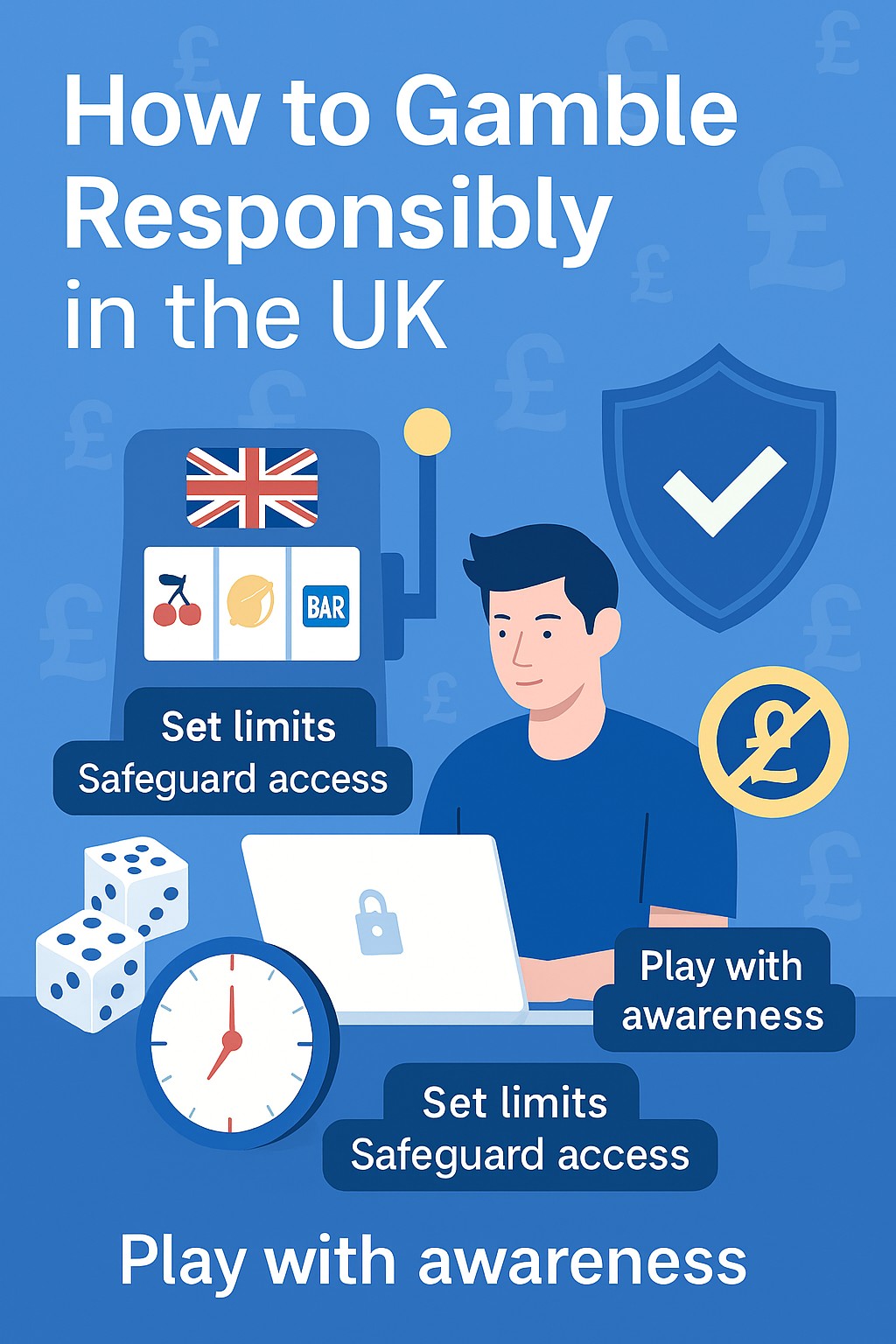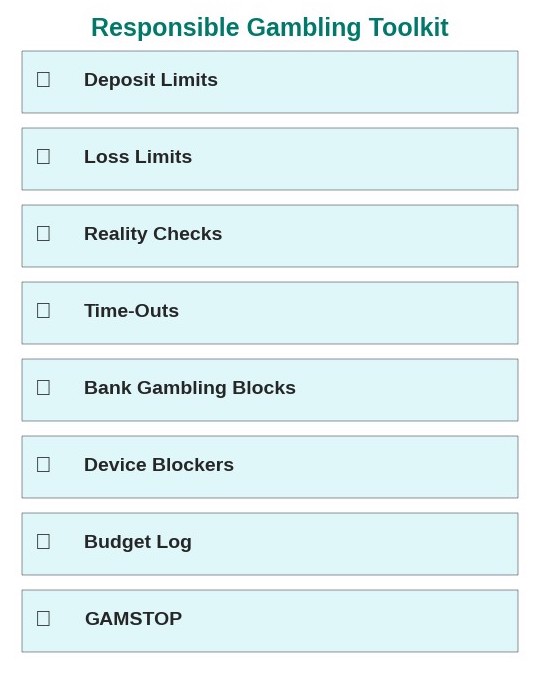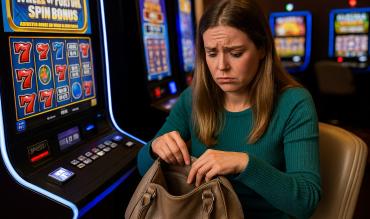Responsible gambling in the UK means treating play as entertainment, not income, and keeping it affordable and time bound. This guide outlines safe casino gambling practices—spend/time limits, reality checks and time-outs, bank gambling blocks—and explains UK protections such as UK Gambling Commission (UKGC)—licensed operators and confidential support.
The article also signposts gambling ethics, gambling harm signs, and practical steps for gambling addiction prevention.
Gambling Is Entertainment, Not Income
Gambling is a paid experience, like a cinema ticket or a night out. Casinos, bookmakers, and lotteries are businesses with margins; over time the odds favour them. Seeing gambling as entertainment—not income—is the key to responsible play and the heart of gambling ethics.
Safe Gambling Practices: Core Habits
Before tools or tactics, mindset matters. The aim is enjoyment without overuse and clear gambling addiction prevention.
- Pre-set limits: Fix a spend cap and session time; treat it as the cost of entertainment.
- Built-in protections: Use deposit/loss limits, reality checks, and time-outs on UKGC-licensed sites.
- Bank gambling blocks: Card-level blocks add strong friction and stop transactions at source.
- Essential funds off-limits: No rent, bills, loans, credit, or borrowed money.
- No chasing losses: A losing session means stop, not “recover.”
- Play only when clear-headed: Tiredness, alcohol, drugs, anger, or stress reduce risk control.
Once your mindset is set, understanding the math helps reinforce control.
Understand Odds and the House Edge
Large slot or lottery wins are rare by design. In fixed-odds games (roulette, blackjack, baccarat), the house edge creates a negative expectation across many sessions. A short hot streak doesn’t change the long-run math. This perspective supports responsible gambling decisions.
Staking Strategies and Betting Systems: The House Edge Remains
Staking plans and betting systems (including progression/serial staking like Martingale or Fibonacci) may change how results feel in the short term, but they do not alter the underlying house edge. There’s no guarantee they will help you win or create any player advantage; your win–loss ratio still swings with variance.
In practice, progression systems can accelerate losses and raise the risk of ruin faster than flat staking—especially during losing runs. For responsible gambling, treat systems as style choices, not profit engines, and keep strict limits.

Game Design Psychology: Why It Keeps You Playing
Near misses and variable rewards (common in slots) create excitement by mimicking “almost winning.” Pre-committed limits and reality checks counter these effects and help maintain safe gambling practices and gambling addiction prevention.
Digital Wallets: Add Friction to Spending
Frictionless deposits can lead to silent overspend. Reduce risk by disabling saved cards, lowering daily transfer limits, enabling bank gambling blocks, and requiring strong authentication before deposits. Add a note to yourself: only deposit on UKGC-licensed sites.
Advertising, Influencers, and Peer Pressure
Sponsorships, tipster streams, and “bet with me” posts highlight wins and hide losses. Treat this as marketing, not advice. In social settings, limits chosen in advance help you resist group momentum; your budget does not need to match anyone else’s stake.
Youth Protection and Vulnerable Groups
Gambling is 18+ in the UK. Log out on shared devices, avoid “remember me,” and use parental controls or device locks. Open gambling isn’t helpful around people managing mental-health difficulties, addiction histories, or financial instability.
Licensing and Regulatory Oversight
Safety improves on UK Gambling Commission-licensed platforms. Licensing brings age checks, safer-gambling tools, standards, and dispute routes. To verify, check the site footer or license page for a valid UKGC number and confirm active status on the register.
Unlicensed sites lack these protections. To verify a license, visit the Gambling Commission’s public register and search by site name or license number.
Poker and Sports Betting: Keep It Responsible
Skill can matter, but variance is real. Track results honestly, manage your betting bank strictly, and keep clear limits. A lucky run is not a guaranteed “edge.” Responsible gambling principles still apply.
Data Privacy and Player Profiling
Operators analyze behavior to retain customers and market offers. Reduce exposure: opt out of promotional emails and push notifications, and review privacy and marketing settings regularly.
If gambling harm signs appear, recovery is possible—and support is confidential.

Mental Health and Recovery: Support Without Judgement
Gambling problems can link to anxiety, depression, stress, or compulsion. Early support prevents escalation. Useful tools include self-exclusion (GAMSTOP), blocking software, peer support, talking therapies, and debt advice. Sharing with someone you trust can provide a reality check and help you prioritize your finances.
Clear Gambling Harm Signs
Watch for: hiding play, tension when not gambling, longer sessions than planned, gambling to alter mood, or moving bill money to stake. Immediate help is advisable where borrowing, chasing losses, or failed quit attempts occur.
Responsible Gambling Statement (UK)
Gambling is paid entertainment. Responsible gambling means keeping play small, time-limited, and transparent, with tools in place and support used early when needed.
Confidential help is available 24/7:
- National Gambling Helpline (GamCare): 0808 8020 133
- BeGambleAware.org: information, tools, and advice
- GAMSTOP: online self-exclusion across most UK-licensed sites and apps
Seeking help is a sign of strength, and support is available without judgement.
FAQs: Responsible Gambling in the UK
What is responsible gambling?
Keeping play small, time-bound, and affordable, with safety tools enabled and support used early.
Can you make money gambling long-term?
Only rarely, and not reliably. Treat gambling as entertainment, not an investment.
What are signs of gambling harm?
Common gambling harm signs include secrecy, chasing losses, using bill money, or gambling to change mood.
What tools help with gambling control?
Deposit/loss limits, reality checks, time-outs, bank gambling blocks, GAMSTOP, device blockers, and a written budget. GAMSTOP blocks access to most UKGC-licensed gambling sites and apps. Registration is free and takes minutes.
Is gambling entertainment or investment?
Entertainment. That view supports gambling ethics and better decisions.


